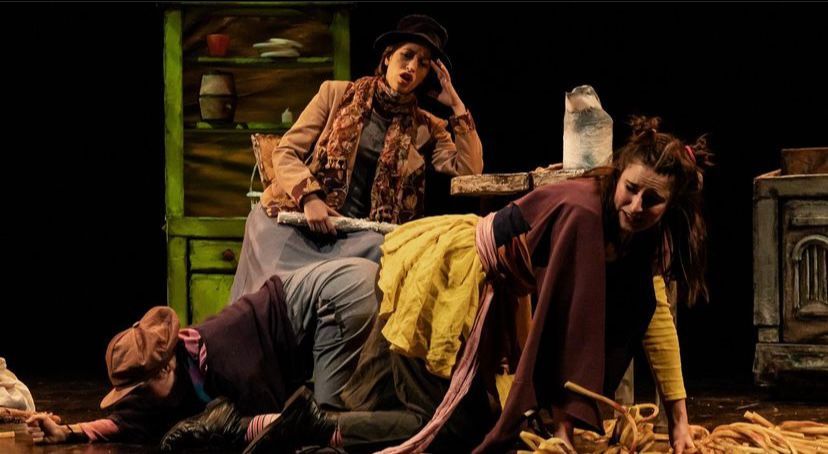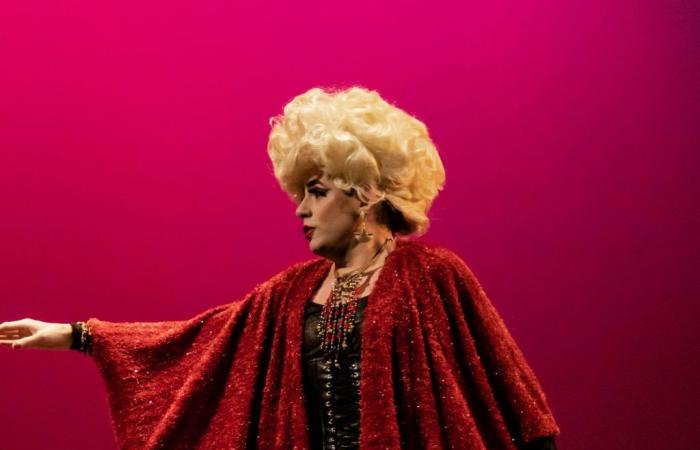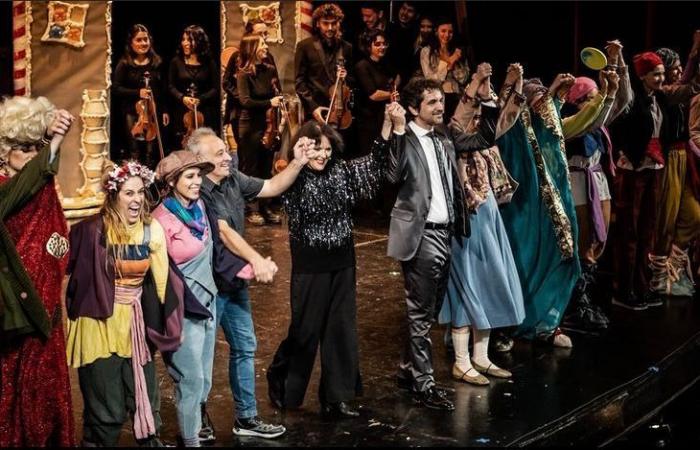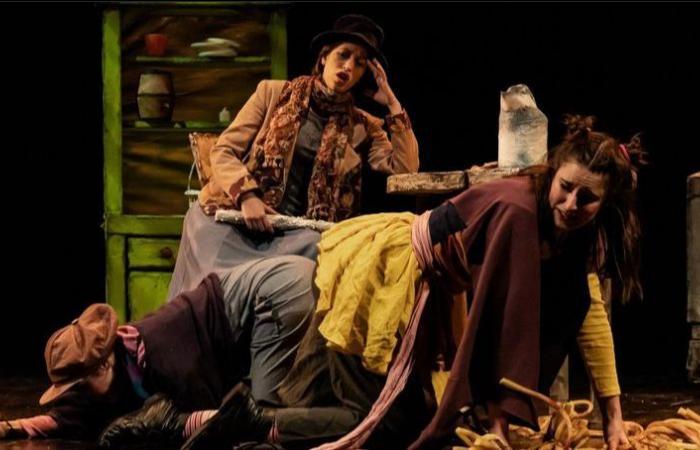Luchi de Gyldenfeldt plays the role of the Witch in “Hänsel und Gretel” at the Teatro Avenida. In this interview she shares her experience and challenges in assuming this role and tells us about this production that will go on stage on July 6 and 13 at 8 p.m. Tickets are on sale for Ticketek.
By Virginia Chacon Dorr
Invited by Graciela de Gyldenfeldt, director of the Buenos Aires Opera Festival, Luchi reveals how the opportunity arose as a challenge in 2022 and how time allowed her to develop and mature the character, highlighting the vocal and scenic demands that it implies. Additionally, she reflects on the deep meaning of the work and the importance of supporting self-management in operatic culture in Argentina.
-How did the role of the Witch come into your career?
-Graciela de Gyldenfeldt proposed it to me, who in addition to being my aunt, is the director of the Buenos Aires Opera Festival. She was thinking about doing ‘Hansel and Gretel’ in German, really wanting to recover a bit of the tradition of opera in German in Argentina. For this reason, this year she did Wagner’s ‘The Flying Dutchman’ with great success and now she is also reviving ‘Hansel and Gretel’.
It was an invitation of the type “why don’t you try this?” For me it came as a challenge. I auditioned him at my father’s house in Santos Lugares and, when I sang it to him, I surprised myself to see that I could do it. We are talking about the beginning of 2022, more than a year before we staged ‘Hansel and Gretel’ in 2023. Time gave me confidence to prepare the character and encouraged me to explore the register: lThe Witch is a character with an enormous vocal extension, she has more than two octaves, sometimes even on the same page, in three or four measures.
-It must have been a laborious process…
-Maturing the role was, and still is, quite an experience. At that time, in 2022, I was singing different works in the bel canto repertoire, which allowed me to keep the focus on vocal beauty and in a healthy and fair place for me, so as not to overdo it with this role that is very histrionic. Also, being a characteristic role, as they say in opera, it is important to sing it with the healthiest principles possible.
I feel like I’m rediscovering the Witch, my Private Witch – Luchi of Gyldenfeldt
-How did you get there and what do you remember about the premiere?
-I remember it was a great challenge. It was wonderful to have arrived confident with the work we did with Pablo Manzanelli, who was the director of the production, and he was fantastic. The premiere was very exciting and also founded my confidence. I remember it as a very important event: I overcame that initial fear and it was like saying “yes, I can do it, I am here and I can sing this.” Then it was a matter of “softening it.” And, although I had already sung with heels with Ópera Queer on many occasions, it was quite a challenge to come out with all that stage impact of the Witch… I was two meters tall, with a wig, heels, I was singing in German, with an orchestra. In addition, it was a huge challenge to premiere the role at 33 years old, being one of the first leading roles that I sang in a theater as a counter-mezzo.
-By rediscovering things about your voice, about your body, about your throat, are you also rediscovering things about the Witch?
-I feel like I’m rediscovering the Witch, my Private Witch. Many thanks to the talks I have with Graciela (N. de la E. de Gyldenfeldt), who has always contributed a lot to me, and to the work we are doing now with Maestro Helge Dorsch. With him we are doing more specific work on German, which is very important since he is a German speaker. We look for that thoroughness in the vowels, the phrasing, the articulation… This is in addition to the first semester in the Baroque Opera Specialization at the Higher Institute of Art of the Teatro Colón, which has allowed me to sing wonderful things with teachers like Federico Ciancio, Victor Torres and Andrés Gerszenzon; and work alongside the precious voices of my colleagues, with whom I share the course. All that baggage is now allowing me to find many more colors in the Witch. I am very grateful to repeat this role, because it is very complex. I think from the first day, from the first performance, I felt like I wanted to sing it several times.
-How would you invite the public to experience this work and what can they expect from the staging?
-The play is for all audiences. The Buenos Aires Opera Festival is doing an incredible and very valuable bet for operastaging productions such as Wagner’s “The Flying Dutchman.” The invitation is for the artistic event itself, it is something you cannot miss. The cast is fabulous: Ana Sampedro as Gretel, Lídice Robinson as Hänsel, maestro Luis Gaeta (with whom it is an honor and a pride for me to share the stage), Virginia Lía Molina as Mutter, Lorena Sayegh as the Sandman and the Dew Fairy, and the direction of Helge Dorsch, a specialist in the German repertoire.
Another great reason to come is to support self-management. I think it is very important to support cultural projects that really want to contribute something to the culture of this moment. I feel that it is a huge effort and a challenge to make an opera of this size at the Teatro Avenida, in Argentina, in 2024. Not only is it an artistically-speaking work not to be missed, but also, by purchasing a ticket from 3,500 pesos on Ticketek, you are contributing to ensuring that this continues and that everything does not become centralised as has happened in other times of crisis in our country.
You cannot miss the opportunity to reconnect with this children’s story, Emilio Urdapilleta’s staging has a lot of that fairy tale – Luchi de Gyldenfeldt
-The story also presents many layers of meaning. What we perceive about this story as adults is not the same as as children. Do you find any of this in the work?
I think that comes through in the production. It’s a story with many layers of meaning, having to do with evil, but also with wit and even seduction. The Witch is not what you imagine, this warty, bent-over lady with a cane… but she is a very seductive person. Suddenly, Gretel, who is the older sister, is initially attracted to the elegance and sophistication of this Witch… but in reality it is cruelty in disguise.
You cannot miss the opportunity to rediscover this children’s story, Emilio Urdapilleta’s staging has a lot of that fairy playwith well-defined scenes such as the house in the forest and the witch’s house. It is in German and subtitled, so I recommend telling the children what it is about beforehand to get them excited; it is a story they already know, which creates a closeness to the work.
Returning to what is human, looking each other in the eyes again is what antagonizes cruelty – Luchi de Gyldenfeldt
-You mentioned cruelty as one of those layers of reading the story. Sometimes we need to see some everyday things on stage to think about them better. Regarding this, do you think cruelty is fashionable?
More than “being fashionable,” I believe two things about cruelty: one, that it is being worshiped too much, and two, that many people have lost sight of the end of that cruelty that climbs senselessly towards an uncertain place. I don’t know if it’s really trendy, I think it started many years ago, but now it’s escalating. What I do believe is that, if cruelty is what we face, and it affects us daily when we learn of something painful, far from ignoring it, we should propose something different. In my case, art is a loving trench for myself, where I can be and allow myself to be. From there, I try to offer a hug to the people who listen to me. May the message be, at this moment, artistic, philosophical and aesthetic, in terms of empowerment and being able to show myself as “la Luchi” at this moment, as a legitimate lyrical singer. Thank myself for that, feel proud of that and be able to generate empathy from that place.
It happened to me recently, when we performed Stabat Mater with the Orchestra of Young Talents together with Mariana Carnovali, in the parish of Niño Jesús in Lugano. When I came out, some people were not expecting me to be there. During the performance, I could feel these people getting excited, but they couldn’t look me in the eye. I looked around a bit to see what was wrong, and they avoided me. However, as the performance progressed, they started to look me in the eye and finally, after the performance, many of them came up to me and greeted me. Returning to what is human, looking into each other’s eyes again is what antagonizes cruelty.

Before finishing our talk, I would like us to talk a little about your relationship with the baroque and the specialization at the Instituto Superior de Arte del Teatro Colón that you are doing.
I am very happy and very grateful. I am proud to be part of the specialization. It is a very human and beautiful group, and the baroque is a wonderful world. I think it proposes a slightly freer environment, with fewer structures. I am very happy and I hope that the specialization continues, so that more people can take advantage of it and grow. We have prepared three concerts with totally different repertoires, which generates a lot of training; you finish one concert and you already have to prepare for the next one. I am very happy, the truth is that it was a great pleasure to have joined. Having Víctor Torres as a teacher is a luxury, and we work on parts like La Mensajera from Monteverdi’s Orfeo. It is something that gives me great pleasure, and it is very important to emphasize that this training is public and free. Training in the path of art having these opportunities, beyond being “la Luchi” (and also for being so), empowers me and brings me great joy.
“Hänsel und Gretel” by Engelbert Humperdinck by Ópera Festival Buenos Aires
Dates and times: July 6 and 13 at 8 p.m.
Location: Teatro Avenida (Av. de Mayo 1222)
Main cast: Lídice Robinson as Hänsel (mezzo-soprano), Ana Sampedro as Gretel (soprano), Luchi de Gyldenfeldt as The Witch, Luis Gaeta as the Father (baritone), Virginia Lía Molina as the Mother (soprano), Lorena Sayegh as the Little Sandman and the Dew Fairy (soprano)
Musical direction: Helge Dorsch
Stage direction: Emilio Urdapilleta
Ticket sales: Through Ticketek from $3450 and at the theater box office
Opera in three acts, based on the fairy tale by the Brothers Grimm. Premiered in Weimar in 1893, directed by Richard Strauss
https://www.ticketek.com.ar/hansel-und-gretel/teatro-avenida




